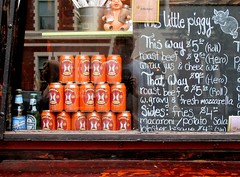Community Board 3 continues to debate whether it should soften its hardline stance against new beer-and-wine licenses in nightlife-saturated areas. Last night, a task-force meeting pitted residents who don’t want to see C.B. 3 bow to late-night noisemakers against a landlord who said he has been financially stymied by the board’s current policy.
In response to evidence that the State Liquor Authority routinely approves beer-and-wine applications even when C.B. 3 recommends disapproval, the board may start supporting the soft stuff in resolution areas that are currently verboten, so long as the applicant agrees to operate primarily in the daytime and close at midnight or earlier. The new stipulations, the board hopes, will both curtail noise and attract more diverse – and especially daytime – businesses.
Residents who live on streets like St. Marks Place and the avenues of Alphabet City, which devolve into something resembling a carnival on weekend nights, showed up at C.B. 3’s offices on East Fourth Street to voice their concerns about the potential policy shift.
Dale Goodson, who lives on East 12th Street and Avenue A, doubted whether the new stipulations would bring in more shoe stores and hardware stores as hoped. “It sounds like a slippery slope to build this ‘return to business’ model on,” he said. “It sounds like we’re saying we need [the stipulations] to bring things back in. It’s a tough tradeoff to start working out in your mind.”
Under C.B. 3’s current policy, owners of buildings within the Community Board’s targeted areas have complained that it’s difficult to attract the type of liquor-selling businesses that tend to pay the highest rents. A landlord with two properties on Ludlow Street, including the building that houses Inoteca, spoke out in favor of a potentially attenuated policy, saying that some direction and reasonable expectations would help a landlord attract tenants.
“Last year when I had a vacancy in a resolution area, anyone in the know was completely turned off to coming to the Community Board because it said, ‘No new licenses in resolution areas,’ and everyone would tell them, ‘Forget about it,’” said the building owner. “I ended up renting to a tenant for a lot less than I could have had with a restaurant.”
Most residents at the meeting, however, had little patience for such concerns. “What I heard the landlord say was the exact reason not to do this,” said Jill Ackerman, who lives in Alphabet City on East 12th Street. “By doing this the landlords will absolutely now rent to restaurants because they will get higher rents. There is no reason for them not to.”
Ms. Ackerman said the policy would work in neighborhoods like SoHo where there is already an abundance of retail businesses and an increase in liquor-selling establishments might benefit the community, add foot traffic and encourage a greater variety of renters. But she didn’t want to see the board support new licenses in the East Village. “Liquor licenses are the one thing we can regulate and hold on to, but it seems like C.B. 3 keeps going to liquor licenses as the savior of the community,” she said.
Others, who saw the proliferation of more restaurants and bars on their streets as an unstoppable force and part of New York City culture, agreed that a compromise to curtail hours for new beer-and-wine applicants was better than having those businesses come in on their own terms.
Ayo Harrington, who has lived on East Fourth Street between Avenues C and D since the 60s, recommended that new applicants be held to a closing time of 11 p.m. Ms. Harrington wistfully remembered the days when hardly a restaurant or bar was in sight. Now that times have changed – and she has a granddaughter to think of – she wants the most realistic solution possible. “The people who are impacted most should be given more consideration than businesses,” she said.





